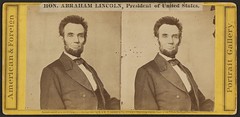 Image via Wikipedia Image via Wikipedia |
| Gov. Beriah Magoffin |
-
In
Richmond, President Jefferson Davis appoints three new special commissioners
to Europe: James M. Mason to Great Britain, John Slidell to France, and
Pierre Rost to Spain./1861
- In Washington, President Lincoln writes Kentucky Governor Beriah Magoffin that the organized Union force encamped in his state will not be removed. Violating Kentucky’s state neutrality is not his concern./1861





























